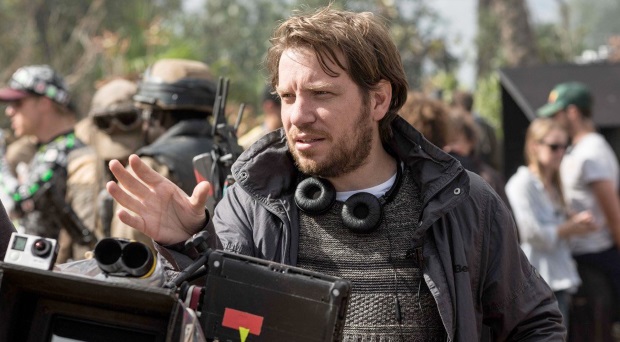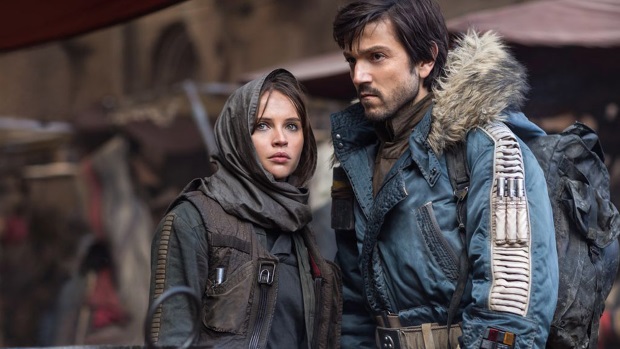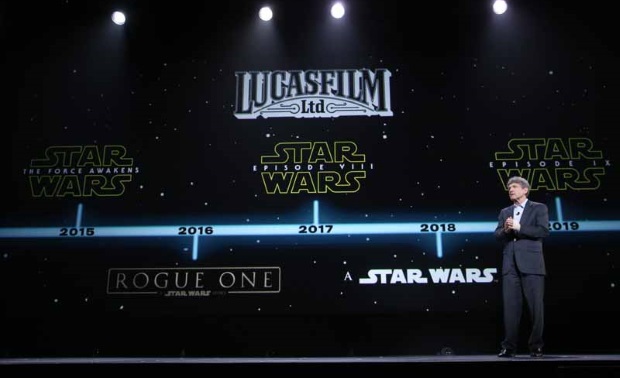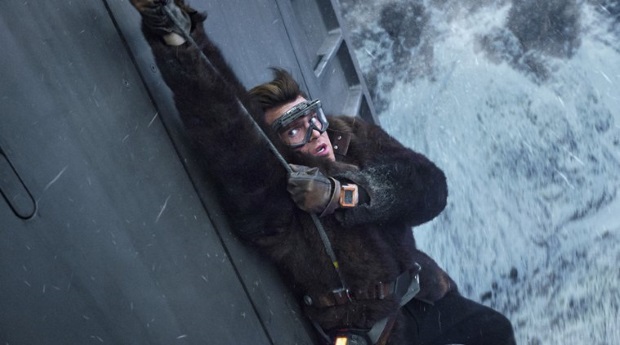How Star Wars Can Avoid Franchise Fatigue
Lucasfilm faces an interesting challenge for Star Wars ahead - so how can it make sure we remain as invested in the franchise?
This article comes from Den of Geek UK.
Spoilers for Rogue One lie ahead specifically, but also we talk openly about plot threads in the other Star Wars films too.
I waited through fallow years for new Star Wars movies, suspecting they’d never come. Yet, four films into the Disney’s run I’m almost at the point where I don’t care if I don’t see another. Colour me happy that we’re getting another shortish quiet spell before Episode IX. I need a break.
Now, as Lucasfilm’s brain trust works to revisit another dead character, in another prequel-in-all-but-name, it’s worthwhile looking at the ways I think it can avoid franchise fatigue and potentially burning itself out.
1. Trust the talent

If we accept that Gareth Edwards was de facto kicked off Rogue One – as befits Tony Gilroy’s pretty blunt assessment of the matter – and that Solo’s original directorial pairing of Phil Lord and Chris Miller count as one sacking, a paraphrasing of Oscar Wilde’s vicious pun seems apposite:
To lose one director could be regarded as misfortune; to lose three would appear to be carelessness.
If you think Lucasfilm et al have learned the right lessons from their Disney family cousins, Marvel, then perhaps that argument is weakening. It currently seems more hell-bent on the kind of disjointed EU DC has settled into. Mikey Newman’s (Movies With Mikey) breakdown of Marvel’s success in creating a successful shared universe, boils down to three words: ’Trust the talent’. I shamelessly cribbed it for this section header, because I wholeheartedly agree with him and couldn’t word it better. It’s a take borne out by the recent success of Taika Waititi (Thor: Ragnarok), James Gunn (Guardians 1 & 2) and Ryan Coogler’s (Black Panther) contributions.
The MCU movie count is now in the high teens, and Marvel is doing still doing some of its best stuff because it has begun routinely giving movies to left-field talent who offer skewed takes on its universe. The same directorial duo who made Half Nelson, a movie about a drug addicted middle-school teacher, are currently putting the finishing touches on Captain Marvel for heaven’s sake.
Its eyebrow raising choices have caused overt problems just once. Edgar Wright walked away from Ant-Man when Marvel declared they wanted to rewrite the script. That retooling was probably in light of its phase 3 plans and Civil War, but Wright and Joe Cornish couldn’t get in line and moved on. Marvel didn’t blink and Peyton Reed stepped in, for better or worse. Crucially, though, all this happened before cameras started rolling; the hard decisions were made in advance.
Marvel Studios’ recruiting obviously has a strong, clear understanding of where its wider arc is going and what it needs to say about each character. Further to this, I’d bet that understanding is forged by knowing about how those characters will eventually end up working side-by-side (see point 2). Because of that overarching vision, it can send its IPs out into the big wide world to work with scary people – because it knows that those people are ready to deliver what it wants, because it can clearly express what that is. If, like Wright and Cornish, they are unhappy with fitting in with the wider vision, they can choose to not be involved. Sad, but clear cut.
Does A Star Wars Story‘s two mid-production firings, whatever the circumstances – to which I am not privy – create the same impression of Lucasfilm?
Miller and Lord, Edwards, and Trevorrow are no clowns. Yet, Star Wars defeated them – or, rather, the machine that creates Star Wars movies did. What their removals says, at least to me, is that Lucasfilm ‘doesn’t know much about art, but it knows what it likes’.
No-doubt inspired by Marvel’s skew towards new talent, it wanted to give directors leeway to do what they wanted with the Star Wars paintbox. However, it appears that, bereft of that solid vision of where it was all going, it was forced to react late in the day when they didn’t deliver what it wanted.

Perhaps the most damning element of the apparent Rogue One debacle was not, I’d argue, the replacement of Edwards, but the problems inherent in the script – which replacement writer/director Tony Gilroy trampled all over in a recent interview. Specifically, he said: “If you look at Rogue, all the difficulty with Rogue, all the confusion of it … and all the mess, and in the end when you get in there, it’s actually very, very simple to solve. Because you sort of go, ‘This is a movie where, folks, just look. Everyone is going to die.’ So it’s a movie about sacrifice… I came in after the director’s cut. I have a screenplay credit in the arbitration that was easily won.”
Rogue One‘s story was not written by Edwards, but by Gary Whitta and John Knoll, with a screenplay by Chris Weitz (Antz, The Golden Compass). Whitta and Knoll (especially Knoll, an ILM vet of almost mythical status) are insiders who have experience at the Star Wars frontline. If they don’t know what Lucasfilm wants in terms of thematic content from their A Star Wars Story shot, it makes me infinitely less inclined to believe that Lucasfilm did.
How – in this day and age, with this size of movie – did the script get as far as a director’s cut before problems were addressed? It happens, I’d suggest, when decisions are made as reactions rather than directions.
If Lucasfilm has, as it seems, committed to making A Star Wars Story a thread of character studies and exposition movies planting known characters in different genres – war movie and western so far – then it’s disappointing, but at least we can conclude that what’s been going on is a misguided plan suffering from too light a hand on the tiller. I’d posit, though, that the ills are more akin to the problems the DCEU has with its movies. Chief being the assumption that, simply because recognizable names are on the posters, the wider public is actually going to come out and see the movie – and that the IP is the driver, rather than what you do with it.
Assumptions like that are missing one of the best lessons Marvel’s phenomenal run has to offer.
Commit to a climax

Even for Star Wars, a run of standalone stories was always going to be a hard sell. There’s a reason anthologies aren’t a big cinematic thing, and the thought that Star Wars could create its own niche in that respect seems like hubris right now.
Thus, the wide-eyed idealism of the Rogue One announcement, and the further plans to create standalone side-projects to the main Star Wars thread, morphed into the pragmatic nostalgia-fests of that movie and Solo. The first of those reeks of being Star Wars‘d up as an afterthought, with legacy characters leveraged to maximum effect – and to the detriment of newer ones. Solo suffers less from easter-egg-itis, simply because it was one big reference-fest from conception to realization.
Marvel didn’t just set out to make a bunch of movies, it started out making one. However, from first frame of Iron Man it was working towards Avengers – should things pan out profitably. Bereft of its best-known character, Spider-Man, it made a commitment to a shared target that would elevate less widely known ones. These shared targets has been the core of the MCU, and audiences responded – even turning out for little-known and fringe offerings (Guardians, Black Panther, Ant-Man) – because the stakes for all its characters were raised with every new release, and the momentum became almost unstoppable.
Star Wars, even with its massive alphabet soup of peripheral characters, as of now gives off no vibe that it is working towards anything other than making more Star Wars ad infinitum.
Most worryingly, the lack of direction in the A Star Wars Story thread appears to be creeping into the main trilogy, too. Empire built upon A New Hope and set-up Return of the Jedi; in contrast The Last Jedi – whether you like it as a film or not – seems to do a lot more ripping down than building up. I’ve heard it argued that it felt more like a conclusion than a set-up, which tore down everything JJ Abrams built in the first movie. I can see that point. So, if even the core of Star Wars seems a bit directionless right now, what chance has an anthology series?
While Solo is ostensibly a stand alone movie, it really isn’t. Does anyone who hasn’t seen the original trilogy care who Han Solo is? Will they care after they’ve seen Solo? I’d argue not in both cases. Telling his story really doesn’t pay off all that much in terms of reward to those people or to committed fans; they’re not learning anything they couldn’t infer from Harrison Ford’s portrayal, and it doesn’t serve to alter or deepen the wider Star Wars story or raise any stakes.
If you’re in the franchise building game, you may as well play it. So..
Ditch A Star Wars Story

This is a literal and figurative piece of advice. Literally, because you’re either making a Star Wars movie or you’re not, there’s no need for that subtitle. Figuratively, because the kind of movies they’re making under the banner echoes the seemingly muddled thinking behind them. Rian Johnson has his own trilogy in development, which is said to be the birth of a new trilogy? It makes no difference either way.
I’m sure there’s a big spreadsheet on Kathleen Kennedy’s computer planning the next 10 years of Star Wars. I’d doubt, however, there’s a flowchart tracing a common thematic or narrative thread that will be woven through them all. I doubt A Star Wars Story is working towards anything. If Lucasfilm wanted to break new ground with its anthology, it has failed miserably. The spin-offs were initially plugged as a chance to tell exciting new stories in new ways using the fabric of George Lucas’ universe, the implication of this was that the trilogy movies would deal with Skywalker arc, and the anthology would stay well clear. After four movies, Luke Skywalker is gone, and IRL tragedy has left the future role of Leia unclear, while A Star Wars Story has produced Episodes 3.5a and b; adjuncts to the wider narrative at best, non sequiturs at worst. So that idea seems to have been trashed.
What’s more, Rogue One and Solo labored under the perverse task of wanting us to feel their role in the OT narrative while trying to leave as few fingerprints as possible on it. Neither really adds to our understanding of Episode IV in any meaningful way. They do not raise any stakes. Nor are they any sort of meaningful diversion away from the things we know from existing films.
Story first, Star Wars later

Write a great story, create great characters and – if the Star Wars universe is as robust and authentic as everyone seems to think it is – it can be plugged into the wider folklore. I’m sure that Lucasfilm would say that’s what they’re doing, but as I see it the they have the cart before the Bantha. What appears to be going on right now is the task of writing stories based on IP – A Solo movie, a Kenobi movie, a Boba Fett movie – and it only makes one wonder how any of these things can truly mean anything, or involve any peril.
Rogue One started with the right idea, but lost its nerve somewhere down the line, and any good intentions there were to go visit new places seem to have been placed in the hands of Jon Favreau’s TV series and Rian Johnson’s ‘new’ trilogy. That seems like a downgrade from the idea of a range of new, diverse, talent getting to play in the sandbox. Well, young at least… Which brings us to…
Better representation

Marvel is only now upping its game on this front, but thankfully it is. Star Wars is way behind – but better representation is key to the future of Star Wars. It’s a big universe, out there, and the faces we see on screen and off- need to reflect that in terms of gender and race.
Here’s a thought:
A New Hope, and the original trilogy storyline, leaned heavily on the work Joseph Campbell, and his book The Hero With A Thousand Faces. That book bought together threads of hero stories from multiple regions of the world and religious leanings to create the idea of a monomyth – an archetypal hero’s story – that reaches across those geographical and spiritual divides. ANH was a pretty worldwide phenomenon because most cultures could find something in its universal message, for western society it was a jolt of traditional storytelling that seemed to possess the depth of the exotic.
Without a diversity of voices and worldviews feeding into our stories, Star Wars denies the lesson George Lucas’ culture-hopping modus opperandi taught us. Yes, you could label it as appropriation, lifting from various cultures and assimilating elements, and that may be valid. However. if we going to keep getting the same stories from the same point of view. If you’re bored of something, its time try looking at it from a different angle.
Try telling me that Patty Jenkins and Ryan Coogler’s alternate views of the world haven’t revolutionised the comic book movie scene, and I’ll call you a liar. Star Wars needs something of a similar jolt – and I can’t see it coming from the three men currently working on new instalments.